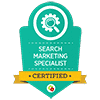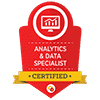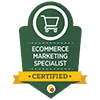Small businesses looking to promote their business online face a very hard decision: Google Ads (PPC) or SEO? Which strategy will grow my small business and provide better returns?
It’s a choice that can be time-consuming, stressful, and not to mention – wrong.
Nobody wants to spend months investing in inadequate marketing practices (especially during COVID), as they eventually take a heavy toll on your bottom line.
Related: Turning to Digital Marketing to Help Your Business Survive COVID-19
Since I know you’re here to grow your business, we’re going to clear up when it’s best to use Google Ads (PPC) or SEO, and how they stack up. Also, which one is the best for your specific business, because it depends.
Today’s main goal: finding out where you should put your money to get substantial results from your next marketing investment.
Which should you use? Google Ads, SEO, or both?
Let’s straighten out the basics:
What is PPC?
PPC means pay-per-click. It’s an advertising model in which advertisers bid or pay for clicks from users. For example, when users type in a specific keyword in search engines like Google, businesses can pay to display their pages and get clicks to them through PPC advertising.
Let’s make it super-duper simple.
See those listings with an “ad” yellow box at the top of the search results?
In short, PPC (pay-per-click) is a paid search marketing model that’s all about paying to appear in these listings.
Or bidding, to be specific.
With PPC, we’re mainly referring to Google Ads.
This is the tool that lets you set up the paid search ads by Google. In other words, where the magic happens.
The way the PPC marketing model works is simple:
Companies bid to place their pages on searches with certain keywords or queries, and they pay a fee each time someone clicks.
PPC is one of the most effective forms of online advertising nowadays. This is to be expected, as Google search is one of the main places today where people procure to look for solutions to their problems.
Easy, right?
What is SEO?
SEO (Search Engine Optimization) is the practice of optimizing your site and pages to show up in the search engines when someone types in a specific keyword.
The purpose of SEO is to help you convince Google that your pages are popular by optimizing them. When Google thinks this, it displays your pages first to users for certain search terms.
As you can see, organic results lie underpaid results and take the majority of the page:
Unlike paid search, organic search web page rankings (or “SEO rankings”) are based on quality, value, and other factors – but not on money.
Google closely evaluates your pages based on many factors and metrics – including click-through-rates, bounce rates, time on page, you name it!
While PPC is about paying for placement, SEO is about providing valuable content and optimizing your pages to convince Google’s algorithm to rank them for free.
When you put all the right factors in place through proper SEO marketing, Google thinks that your pages are amazing and shows them to users.
Put this into perspective:
Did you know that the first three organic results get about 75% of all traffic?
This means that if you’re not on top when people search, it’s difficult to get noticed in today’s crowded online world.
Smart SEO marketing will get you there. It tells Google that your page is popular and that it deserves those top spots – resulting in considerable amounts of organic traffic to your website.
PPC: Is it worth it?
You may be wondering, is paid search worth it despite the fact that you have to pay for each and every visitor?
What if the traffic doesn’t bring enough returns, resulting in a wasted investment of both money and time?
Here’s the thing. Although PPC is not for every company and has its downsides, it’s no shaggy-dog story.
PPC is the real deal.
All sorts of businesses and industries across the US take advantage of PPC to get more sales and clients. This includes countless small businesses, and probably your competitors as well.
It’s pretty clear that PPC works. It’s not up to debate.
But is PPC a viable strategy to get customers for your small business?
Benefits of PPC: Are Google Ads right for my small business?
PPC is a goldmine. Whether your business should tap into it depends on various factors, such as your strategy, customers, and resources.
Let’s uncover what PPC has to offer.
For starters, there’s a very appealing, succulent benefit of Google Ads that SEO simply doesn’t have.
Quick results
Instead of restlessly waiting months until your content finally starts to get meager scraps of traffic, PPC has the potential to generate customers for your business in a matter of days or even hours.
With an effective strategy and properly optimized Google search ads, you can bring in truckloads of visitors to your pages almost immediately.
Well, that almost sounded too good, but it’s not far from the truth.
Realistically, it takes at least a couple of months to tweak and optimize your ads to provide a greater return than what the traffic costs. It probably won’t happen in a few days (although it can), but you can get there fairly quickly.
Google search ads need to run for a period of time before working well because they need to be optimized very intelligently. Unfortunately, it’s not as simple as setting them up to make profits.
You’ll need to gather data and optimize them on a daily basis. This means fixing issues, making improvements to your copy, testing different ads, tweaking keywords, and more. This isn’t something that can be done overnight, and it will take you at least a couple of months.
Still, getting skyrocket results in this timeframe is downright impossible (even for the best SEO managers out there). Building authority and improving organic web page rankings takes time. There’s no way around it.
Although it has a better ROI over time, SEO is a long-term strategy. When looking for short-term results, PPC is the winner.
Paid ads on Google are placed at the top of the page
Your listings are the first thing users see when they search for your targeted queries. Even before organic listings.
A lot of users don’t know these are ads, which kinda helps them blend in with the organic results and get more clicks.
I say “kinda” because, to be fair, most users skip to the organic results.
But even if they don’t click on your ad, being at the top greatly increases visibility. And for what it is – an ad – it’s a hard deal to beat considering the circumstances under which it is displayed.
Target potential customers with laser focus
Another amazing benefit of PPC is that it lets you target potential customers with laser-like accuracy.
Like, laser beam, accuracy.
Want to appear on a specific query or set of keywords?
Literally no further than a bid away. In PPC, there are no limits.
Not just in terms of keywords and queries, but also in the degree of control that you have on the appearance and content of your listings.
The not-so-fun thing about PPC is the constant cost, but laser-targeted ads can be so effective at generating good leads that the investment pays off.
Think about it, by targeting the keywords that your ideal customers use, you’re essentially paying a few bucks or cents for highly convertible leads.
Speaking of which, you should pin down who your ideal customers are to succeed in PPC (or in SEO, for that matter).
The best way to do that is by creating a buyer persona, so make sure you do your research on how to make one.
We explain how to create a buyer persona here, but you can use another resource as long as you actually do it. (Sorry for the bolds, but it really is essential). Here’s why it’s so important:
Marketing Buyers Persona: Why it is important for your Business?
Back to the topic, let’s see how SEO stacks up.
SEO: How effective is it?
SEO is one of the most popular topics among marketers for a good reason. Long-term, it can be an incredibly cost-effective way to drive traffic to your website. Although it usually takes some amount of time to work, its high ROI pays off.
Why would you choose SEO if it takes months of hard work to start producing any signs of results?
SEO marketing is about providing valuable and optimized content to rank your pages highly in organic search.
Master it, and the rewards are juicy:
- Lots of traffic at no cost per click.
- A downstream of leads automagically flowing towards your sales funnel.
No cost per click
SEO as a strategy largely gets its rep due to the lack of costs per click while having the potential to generate heaps of traffic.
The organic search model gives businesses the opportunity to power their marketing with great content and not just money.
This means creativity, time, and effort can be used to compete against larger budgets.
This is great news for you:
Smaller-scale businesses get a better opportunity at competing with larger brands, as money is not the one and only factor of the whole web ranking equation.
It still has costs, as it requires a large time investment to get high SEO rankings. But the faucet doesn’t stop running when you stop paying.
Additionally, it provides higher conversion rates and better results over time.
When compared to PPC’s purely budget-based system, it’s very appealing when looking to cut down costs.
Anyway:
Credibility and clicks
When one is based on paying, and the other is based on providing the most value to the consumer, it’s not hard to figure out which one gets more clicks.
The masses are moving through organic search, not paid search. The traffic that organic search lets you tap into is much higher.
Largely, it’s because people have more trust in organic results, as they are more consistently valuable. From your consumer’s perspective, a high organic ranking is an instant credibility boost.
Local businesses with a physical store or location can greatly benefit from this positioning, as local SEO increases their awareness and credibility to customers nearby.
Greater ROI
SEO is more cost-effective than PPC, and the ROI is higher. When looking for the best possible returns in the future, SEO is a no-doubter.
Nevertheless, during that initial time when your business hasn’t established a presence in organic search, prioritizing PPC can bring in considerably more short-term returns.
The million-dollar question: paid vs organic marketing?
Google lets you appear immediately on the first page by bidding for keywords, making paid marketing ideal for quick results. If you have the resources to create great content and can wait, organic marketing can be more cost-effective and provide results that get better over time.
A better ROI is a very good reason to prioritize SEO over Google Ads.
But if your business doesn’t have the time or resources to wait for that long, PPC may be able to quickly provide that much-necessary relief.
Ask yourself this (kinda oversimplified) question:
What would you rather sacrifice more, time or money?
Do SEO and PPC work together?
In today’s multi-channel landscape, SEO and PPC support each other in various ways. Together, they let you gather more data to make better decisions, increase your overall presence, and create more opportunities to remarket to previous visitors.
An even better choice is to use both SEO and PPC than either alone. When the circumstances allow for it, a combination of both strategies can support each other.
Feed your SEO with data from Google Ads campaigns
PPC lets you test descriptions, titles, keywords, and other aspects of your ads more flexibly than in SEO because you can immediately get your ads to rank high, and testing multiple versions of the same page is much easier.
Add in the fact that Google Ads provides you with insights and metrics of how they are performing, and gathering data of your content’s performance becomes a breeze.
This data of your content is useful to improve your small business SEO. For example, you can test various page headings on your PPC ad campaigns, and pick the best-performing one for your SEO content.
There are countless ways to use PPC data to improve your organic search engine rankings. You can use it to test landing pages, to find effective SEO keywords, to optimize your headings and SEO copywriting, and much more.
Multi-channel presence
PPC and SEO also support each other by increasing your brand’s overall visibility and availability. In today’s multi-channel landscape, customers typically go through multiple touchpoints and channels before converting.
Brands available in multiple channels have higher conversion rates, improved customer retention, and better results overall.
Tired of all this technical jargon?
Understanding all this technical jargon as a small business owner can be tiring and time-consuming. You want to spend more time on your business, but promoting it can take you away from more important tasks. After all, becoming a PPC or SEO expert isn’t an overnight thing.
We know all this marketing stuff takes a lot to learn and implement, so we decided to build AE Design Co. with one purpose: to help small business owners succeed in the marketing side of running their business.
Schedule a Free Marketing Audit & Strategy Session to learn how we work on the low-hanging fruit to get you high quality leads faster.







